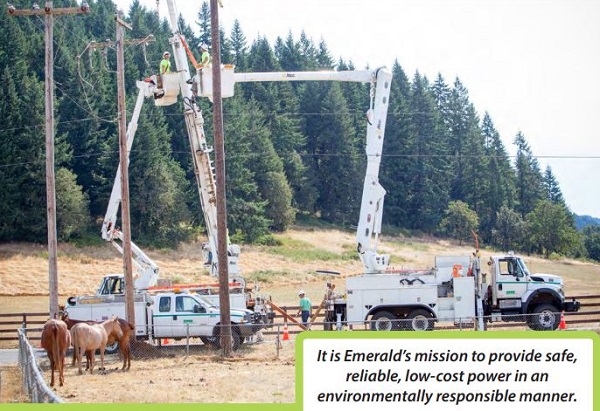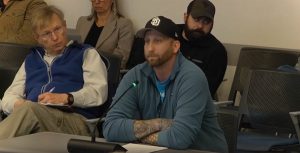EPUD to ask Lane County to continue longtime partnership Aug. 20
8 min read
The Emerald People’s Utility District (EPUD) helps Lane County meet its climate goals, and asks for speakers to express support at a commissioners’ meeting scheduled for Aug. 20.
Kyle Roadman (EPUD general manager): As background, we’ve been focused on really increasing the amount of landfill gas that we capture and recover out at Short Mountain. And, just to look at our budget, we’ve doubled what we’re spending out there over the last five years to be able to do just that, to capture more and more gas.
[00:00:30] That was really driven by some dialogue we’ve had with Lane County over the last decade, where they’ve asked for more assistance on trying to meet their carbon goals. And the good news is that the investment we’ve made really has worked. We’ve increased our gas recovery rate from something around 40% or 50% 10 years ago to something that’s now approaching at 70%.
[00:00:49] So that’s all gas—and in particular methane—that is no longer just going up into the atmosphere. We’re effectively capturing it and running it through our engines.
[00:00:59] Unfortunately, a side effect of this is that those higher gas recovery levels mean that our engines now are running a lot more than they have in the past, so we have to consume the gas and then run it through our engines to generate electricity, which we use to serve our customers.
[00:01:14] John Q: At the LRAPA advisory committee meeting July 30, members discussed how EPUD may face fines for exceeding levels in its air quality permit.
[00:01:25] Kyle Roadman (EPUD general manager): So the higher gas levels are one contributing factor here.
[00:01:28] Another one that LRAPA has cited and that makes sense is that we’re continuing to pull from some older wells as well. And this is really to assist the county with some of their own surface air emissions compliance they have to do, they’ll go out there and take reads of how much is being emitted just on the ground at the landfill. That’s a compliance requirement for the county. We have our own compliance requirements at our landfill, our generation plant, and they measure what comes out of our engines and we have to comply with that.
[00:01:58] But with regard to what happens in the landfill, we’ve really tried to assist the county there. So they’ll give us a heads up: ‘Hey, there’s a hot spot over here where there’s more emissions than we’d like to see,’ or ‘that we’re being asked about’ and we’ll go either install some new facilities or we’ll put more vacuum on those older wells at those sites.
[00:02:16] And unfortunately, the gas content on those older wells is just not as good as it is on some of the newer locations that we have. And that impacts the engine emissions numbers that we have to comply with. So, it’s really that combination of generally higher gas levels that we’re now recovering, but also pulling more from some of these older wells that got us in here.
[00:02:38] And, you know, to some degree that’s unfortunate because, you know, we sure thought we were doing the right thing by capturing as much landfill gas as possible and helping the county with their own surface emissions permitting. It’s what they’ve been asking us to do for a long time. So we were very focused on: ‘Let’s capture as much as we can out there.’
[00:02:55] Unfortunately, that all kind of tripped us up on the back end with our own engine emissions.
[00:02:59] We’ve got the exceedances that happened in 2023. The good news is that, after meeting with LRAPA and working with their staff, we do have a very clear path forward to ensure this doesn’t happen again.
[00:03:11] We’re going to be applying for a modified permit that’s going to account for these higher gas recovery levels. So that alone should allow us to stay within the right range there. It’ll give us the additional allowances that we need.
[00:03:24] We’re also going to be retiring a lot of those old wells. So where they (LRAPA) found we were pulling gas that wasn’t the normal amount of methane content, we’re going to be looking to either shut those down or hand them over to the county so they can deal with their own surface air emissions separately from what we have at our engines.
[00:03:40] So, between those things, and just generally close monitoring of emissions on a monthly basis, we think we have a very solid plan here.
[00:03:46] We’re actively engaged with LRAPA on this. They’ve been a really good partner of ours for 30+ years really, is what it’s been, working with them on air permitting out there. So we appreciate the good work that they’re doing. We have a strong working relationship.
[00:03:59] And this issue is really no different. We sat down with them and had a good conversation about what was the root cause here and what we’re doing to address it moving forward.
[00:04:09] You know, at a high level, everybody seems to agree that this is a bit of an unfortunate situation.
[00:04:15] So LRAPA, I mean, we get along great with them. We’re working positively with them to resolve this little blip that we had.
[00:04:21] And I think that they understand, we’ve got a plan in place here that’s going to work well.
[00:04:25] John Q: Despite that long and successful partnership, Lane County did not include EPUD in discussions for another methane gas facility, known as the IMERF, or the CleanLane project.
[00:04:37] Kyle Roadman (EPUD general manager): We really want to be good partners with all parties here. With the county, we’ve done great work with them for the last 30 years. We work with them on all kinds of issues. We just happen to really disagree with their approach here and the way that they’ve gone about putting this project in place, really without our engagement on it, from our point of view, we had talked about a waste recovery facility and a digester at the Short Mountain landfill. That was in our revised contract with the county back when we signed it in late 2017.
[00:05:08] And what’s happened here is they’ve now placed it outside the landfill, which means that Emerald doesn’t get to participate. And so that’s been difficult for us because, again, we’re spending a lot more money out there. And now we’re not going to get the benefit of having that increased gas. So we’re still working through that with them.
[00:05:24] We’re hopeful for some kind of a resolution, but we’re definitely engaging to try to make sure that the public’s aware that this happened. And it’s going to, you know, eventually cause higher rates for our customers, which we just know, we think is a very bad outcome unfortunately.
[00:05:37] Well, our understanding is they’re going to talk about it again on the 20th of August at the commissioner meeting. We’ve been making regular public comment to the county. We’ve been making our customers aware and asking them to provide their own comments.
[00:05:50] And they’ve been doing that. We have an online petition, many thousands of customers have signed it and asked them to come back to the table and rethink this whole thing. We’ve been talking with the commissioners individually.
[00:06:00] But we do think Aug. 20 is a very important date and we’re going to be asking folks to show up if they can and make comment and ask them to work with us to figure out a better path forward.
[00:06:11] So. When you start to talk about our partnership with the county—and our relationship with the county, it’s always been maybe a little unorthodox how we operate out there. Oftentimes, the landfill, there’ll be a single owner-operator. Because of the history, we tend to be looked at to operate the well field, although the county owns it.
[00:06:31] So there’s a relationship there that’s obviously very important to make sure that this all plays out the way that we want it to. And I think what I’d say about the IMERF is that started to call into question the long-term viability of that partnership.
[00:06:45] The quotes you’ve heard about, ‘There’s plenty of gas for everybody,’ I will just say that it really is a zero-sum game; that there’s a finite quantity of methane at the landfill.
[00:06:54] And if the county’s diverting waste, such that the gas is no longer going to be available in the landfill, that does have a significant impact on us. It’s less fuel supply that we have to be able to operate our engines out there—over the long run. This is a 20-year time horizon that we’re talking about.
[00:07:11] And we’ve shown the county that analysis. We’ve said, ‘We’ve had engineering firms look at this for us that, over the next 20 years, it’s about a 20% to 30% reduction in the amount of methane that we’re going to be able to capture because of the IMERF facility.’
[00:07:26] And the county’s argument is, ‘Well, that’ll just put you back where you were over the last decade.’
[00:07:31] And it’s a little hard to get across, I guess, my feelings about that, because we have consciously invested hundreds of thousands, if not millions of dollars over the last five years to increase the amount of gas capture that we have out there. And so the county’s take has been, ‘Well, you know, that’s great. And your reward for that is going to be to have the exact same amount of gas that you’ve always had.’ We’ve put charts out there for them, shows increasing the gas recovery rate to 65%, 70%. It gives us a lot more fuel supply that we can run through our engines—that we were counting on, to be able to make this a cost-effective operation for us.
[00:08:08] By diverting the materials that they plan to do with the IMERF, we lose out on a lot. We no longer get that increase for the investment that we’ve made. So we’re kind of stuck, spending double what we have in the past each year, just to get the same amount of gas that we’ve always had.
[00:08:23] We went through and really tried to be a good partner, spend a lot more money out there to get those gas capture rates up. We get no benefit from doing that. And that’s really the root of all of this for us is, we feel like that’s real economic damage.
[00:08:36] And now we basically get nothing for it because of the IMERF. So that’s been our position. And that’s where our commissioner made the comment that there’s not enough gas for everybody, because if you’re diverting it, then it’s a zero-sum game. We have less to be able to work with out there.
[00:08:50] John Q: Lane County commissioners are scheduled to discuss contract approval on the CleanLane, or IMERF project, on Aug. 20. EPUD officials are asking for public support. For more information, see the commissioners’ website.






